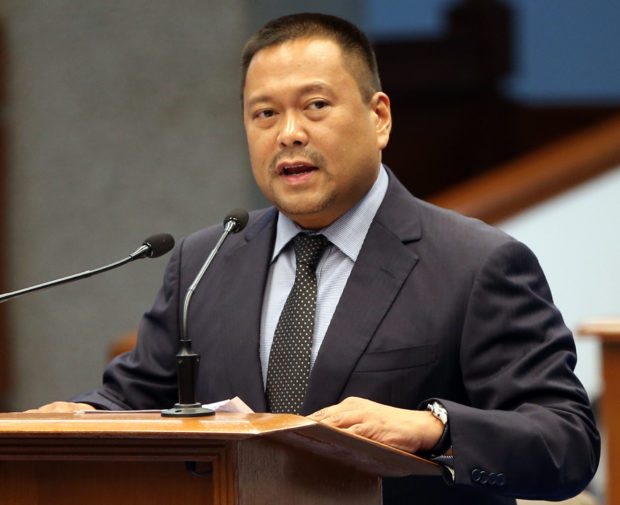Ejercito: No to deferral of UHC law even amid ‘ghost’ dialysis controversy

Sen. JV Ejercito (File photo by EDWIN BACASMAS / Philippine Daily Inquirer)
MANILA, Philippines — Outgoing Senator JV Ejercito is not in favor of suspending the Universal Healthcare Law (UHC) even amid allegations that the Philippine Health Insurance Corp. (PhilHealth) was allegedly paying “ghost” dialysis treatments.
Ejercito, principal sponsor and among co-authors of the landmark legislation in the Senate, said Thursday that patients who badly needs dialysis should not suffer because of allegations of fraudulent transactions within Philhealth.
“Why deprive the Filipino people of access to good quality healthcare?” Ejercito told INQUIRER.net in a text message.
“PhilHealth should continue providing health services but (it must) ensure the authenticity of those who avail the services,” he added.
The lawmaker also said PhilHealth should go after those health care providers who committed fraudulent acts.
Article continues after this advertisementAn investigative report by the Inquirer bared that the Quezon City-based WellMed Dialysis & Laboratory Center Corp. (WellMed) continues to ask PhilHealth for dialysis payments even when their patients have already passed away.
Article continues after this advertisementREAD: PhilHealth pays for ghost kidney treatments
The UHC Law, which President Rodrigo Duterte signed into law last February, automatically enrolls all Filipino citizens in the National Health Insurance Program and prescribes complementary reforms in the healthcare system.
Currently, the implementing rules and regulations for the UHC Law are being crafted.
The lawmaker likewise mentioned that the UHC Law “provided stiffer penalties for unethical and fraudulent transactions,” citing Section 38 (b) of the law.
The provision states that a health care provider “who commits an unethical act, abuses the authority vested upon the health care provider, or performs a fraudulent act shall be punished by a fine of P200,000 for each count, or suspension of its contracts or accreditation whichever is shorter, or both, at the discretion of the PhilHealth, taking into consideration the gravity of the offenses.”
Violators of the law may also face imprisonment of six months and one day up to six years.
In a press briefing Thursday, lawyer Harry Roque called for the suspension of the UHC Law’s implementation after the report on “ghost” dialysis treatments surfaced.
Roque, a former Kabayan party-list representative, was among the co-authors of the universal health care bill in Congress. (Editor: Katherine G. Adraneda)
RELATED STORIES
Harry Roque: Suspend Universal Health Care law amid PhilHealth mess
Bayan Muna to gov’t: Probe ‘ghost’ kidney treatments paid by PhilHealth
Hontiveros seeks probe into ‘ghost’ dialysis paid by PhilHealth
PhilHealth sues dialysis center for ‘ghost’ kidney treatments
Roque: Whistleblowers to file cases vs PhilHealth execs over ‘ghost’ dialysis